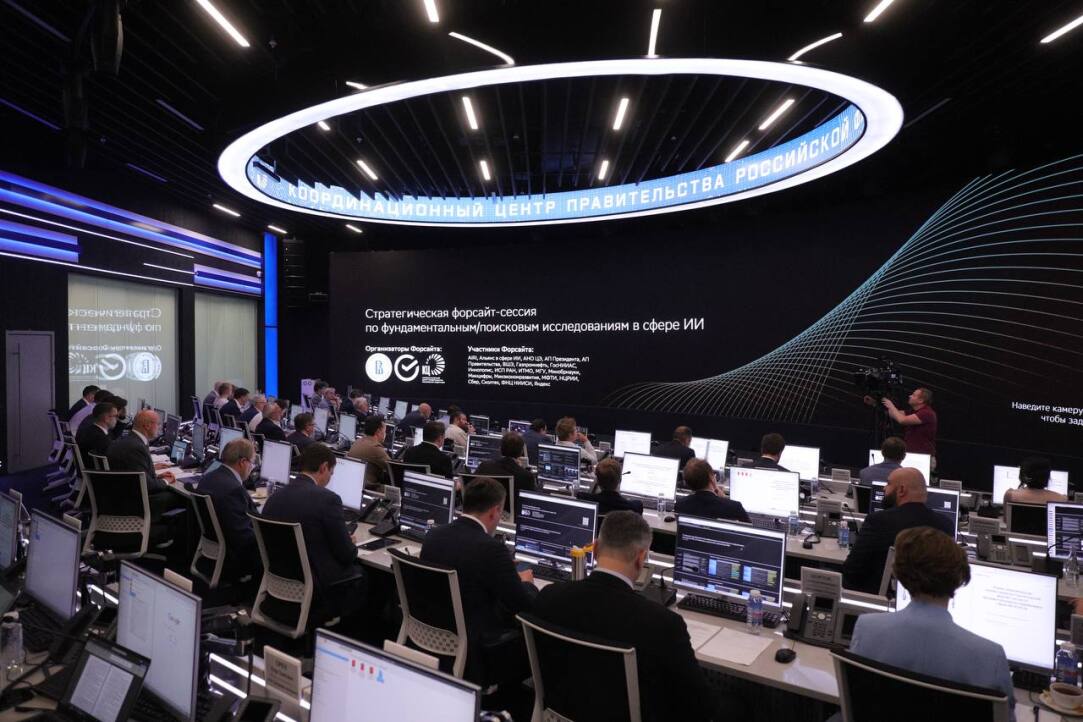HSE University and Sber Conduct Foresight in Artificial Intelligence

HSE University, in collaboration with Sber, have conducted a foresight study on artificial intelligence (AI). Its early results were discussed by the participants of a strategic foresight session on exploratory research in AI, held at the Coordination Centre of the Russian Government, headed by Deputy Prime Minister Dmitry Chernyshenko. The results from the foresight study will inform the Unified Research and Development Programme in the Field of AI.
Foresight refers to large-scale studies designed to identify promising areas for the development of science and technology that can impact the economy and society in the medium and long term. Foresight focuses not only on evaluating potential scenarios for science and technology development but also on selecting the preferable ones by involving key stakeholders and leading scientists from various scientific schools to build a coordinated position. Expert assessments (qualitative methods) form the basis for evaluating future options, while quantitative methods and big data analysis are also among the foresight techniques. AI foresight is a type of industry-level foresight. In addition, the HSE Institute for Statistical Studies and Economics of Knowledge (ISSEK) conducts foresight studies at the national, international, and corporate levels.
Work on AI foresight started in February 2024, almost simultaneously with the approval of the updated National AI Development Strategy for the period until 2030. More than 50 of the most esteemed experts in the field, representing business and government, participated in the study. Addressing the Coordination Centre's session, Mikhail Skvirsky, Managing Director at Sberbank PJSC, and Leonid Gokhberg, First Vice Rector and Director of ISSEK at HSE University, shared the objectives and progress of the foresight study.
HSE University was tasked with providing the foresight methodology. The study design was determined, in particular, based on key features of the AI field, such as its high dynamism and rapid implementation of scientific results into new products and services, Professor Gokhberg explained.
The task of identifying promising research areas in the field of AI was accomplished within an extremely short timeframe, spanning from February to May. During this period, the foresight organisers conducted an analysis of global trends and markets, scientific frontiers, and growth points, and also a series of surveys, expert interviews, and foresight sessions which involved leading Russian researchers in the field of AI.

The foresight analysis resulted in a three-level classification describing exploratory research in the field of AI. This classification includes ten key areas (such as fundamental and generative models, machine learning architectures and algorithms, security, trust, and explainability of AI), along with 37 subareas and 127 research tasks.

Maxim Kolesnikov
The results from the foresight analysis will form the foundation of the Unified Research and Development Programme in the Field of AI, according to Deputy Minister of Economic Development of the Russian Federation Maxim Kolesnikov. Additionally, it was decided to recommend the Russian Academy of Sciences (represented at the session by its President Gennady Krasnikov) to use the obtained results, starting from 2025, in the selection of exploratory research and examination of incoming research applications.
Maxim Kolesnikov also highlighted that support for flagship research centres in the field of AI, selected within the framework of the first wave, will end in 2024, and to ensure seamless financing of research in this area, new centres (of the third wave) will soon be selected. He emphasised that this would indeed entail 'a new selection, rather than an automatic extension of support for existing centres.'
The primary parameters of the new selection include conducting basic research on priority topics aligned with the results of foresight, implementing applied research commissioned by industry partners, and facilitating the training of scientific specialists.

Dmitry Chernyshenko
'Artificial intelligence has become the driving force behind industries aimed to ensure the development of the supply-side economy. Simultaneously, with the emergence of large language models, our focus is increasingly on supporting basic science. Specifically, we have established AI research centres and have started using them to train scientists who will specialise in adapting generative AI to meet the requirements from various industries. This collaboration will enable us to attain technological leadership while enhancing the quality of people's lives, generating new employment opportunities, and bolstering the competitiveness of the economy.'
See also:
Larger Groups of Students Use AI More Effectively in Learning
Researchers at the Institute of Education and the Faculty of Economic Sciences at HSE University have studied what factors determine the success of student group projects when they are completed with the help of artificial intelligence (AI). Their findings suggest that, in addition to the knowledge level of the team members, the size of the group also plays a significant role—the larger it is, the more efficient the process becomes. The study was published in Innovations in Education and Teaching International.
HSE Researchers Assess Creative Industry Losses from Use of GenAI
Speaking at the IPQuorum.Music forum on October 15, Leonid Gokhberg, HSE First Vice Rector, and Daniil Kudrin, an expert at the Centre for Industry and Corporate Projects of HSE ISSEK, presented the findings of the first study in Russia on the economic impact of GenAI on creative professions. The analysis shows that creators’ potential losses could reach one trillion roubles by 2030.
‘Fall into ML Has Firmly Established Itself as a Landmark Event in Russia’s AI Scene’
On October 24–25, 2025, the AI and Digital Science Institute of the HSE Faculty of Computer Science will host the fourth annual Fall into ML 2025 conference at the HSE Cultural Centre. The event is once again supported by its general partner, Sber. The focus this year is on breakthrough research and the future of fundamental AI.
Critique of Obscure Reason: Artificial Intelligence in the Perception of Mathematicians
Mathematicians at HSE University believe that there is no need to fear losing jobs because of the widespread use of AI, while at the same time they warn against uncritical acceptance of works and projects prepared with its help. AI, however, can be a useful tool in research, creating models and processing large volumes of information.
Registration for Russian Olympiad in Artificial Intelligence 2025 Now Open
Registration for the fifth season of the Russian Olympiad in Artificial Intelligence has opened. This year, the competition has gained international status. The event is open to students in the 8–11 grades both in Russia and abroad. The winners will receive benefits when applying to Russian universities.
Global AI Trends Discussed at International Foresight Workshop at HSE University
At an international foresight workshop on artificial intelligence held at HSE University, Russian and foreign scholars discussed the trends and challenges arising from the rapid development of AI.
HSE Students Win International Olympiad in Artificial Intelligence
In the finals of the olympiad, the Russian team competed with 300 talented schoolchildren from 61 countries, including Australia, Brazil, Hungary, China, Mexico, the United Arab Emirates, Poland, Serbia, Singapore, the USA, Sweden, and Japan. The finals included team and individual rounds. In the team round, the Russian team made it into the top 10, winning a silver medal. In the individual competition, Russian schoolchildren won six gold medals, one silver, and one bronze.
‘Neural Networks Can Provide Assessments As Accurate As Humans’
Voice assistants have become part of everyday life. They can plan routes, play music and films, and answer questions. But the quality of their speech requires assessment. To address this, students of the Applied Artificial Intelligence Workshop at the HSE University and VK Engineering and Mathematics Schoolhave developed neural networks capable of evaluating speech synthesis.
HSE to Entrust Routine CPD Programme Development to AI
HSE University, together with the EdTech company CDO Global, is launching AI-based constructors to streamline the design of continuing professional development (CPD) courses. The new service will automate the preparation of teaching materials and assessment tools, significantly reducing the time and resources required of lecturers and instructional designers.
HSE University Becomes Absolute Leader in AI Alliance Ranking of Universities
TheAI Alliance Russia has announced a new ranking of Russian universities based on the quality of education in the field of AI. A total of 203 universities from 68 Russian regions participated in the ranking. HSE University was the first to join the highest A++ group.



